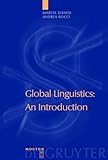Global Linguistics : An Introduction / Marcel Danesi, Andrea Rocci.
Material type: TextSeries: Approaches to Applied Semiotics [AAS] ; 7Publisher: Berlin ; Boston : De Gruyter Mouton, [2009]Copyright date: ©2009Description: 1 online resource (270 p.)Content type:
TextSeries: Approaches to Applied Semiotics [AAS] ; 7Publisher: Berlin ; Boston : De Gruyter Mouton, [2009]Copyright date: ©2009Description: 1 online resource (270 p.)Content type: - 9783110214055
- 9783110214048
- 410
- P94.6
- online - DeGruyter
- Issued also in print.
| Item type | Current library | Call number | URL | Status | Notes | Barcode | |
|---|---|---|---|---|---|---|---|
 eBook
eBook
|
Biblioteca "Angelicum" Pont. Univ. S.Tommaso d'Aquino Nuvola online | online - DeGruyter (Browse shelf(Opens below)) | Online access | Not for loan (Accesso limitato) | Accesso per gli utenti autorizzati / Access for authorized users | (dgr)9783110214048 |
Browsing Biblioteca "Angelicum" Pont. Univ. S.Tommaso d'Aquino shelves, Shelving location: Nuvola online Close shelf browser (Hides shelf browser)

|

|

|

|

|

|

|
||
| online - DeGruyter Regel und Witz : Wittgensteinsche Perspektiven auf Mathematik, Sprache und Moral / | online - DeGruyter Vom Selbst-Verständnis in Antike und Neuzeit / Notions of the Self in Antiquity and Beyond / | online - DeGruyter Tears in the Graeco-Roman World / | online - DeGruyter Global Linguistics : An Introduction / | online - DeGruyter The Local Construction of a Global Language : Ideologies of English in South Korea / | online - DeGruyter Raum-Zeit / | online - DeGruyter Demokratie unter Bedingungen der Weltgesellschaft? : Normative Grundlagen legitimer Herrschaft in einer globalen politischen Ordnung / |
Frontmatter -- Contents -- Chapter 1. Language in the global village -- Chapter 2. Speech -- Chapter 3. Communication -- Chapter 4. Culture -- Chapter 5. Argumentation -- Chapter 6. Global Linguistics -- Backmatter
restricted access online access with authorization star
http://purl.org/coar/access_right/c_16ec
The book provides an introduction to an interdisciplinary field of inquiry that can be called "global linguistics" (GL). GL emerges to tackle the ever-growing phenomenon of intercultural communication (IC) in today's world of international contacts. The specific aim of GL is to look at the form and contents of dialogues among speakers of different cultural backgrounds who will use a "default language" or koiné (usually English) to interact, in order to detect communication breakdowns at various levels of "depth", as well as the opportunities for developing sound intercultural communication practice. The book includes an accessible presentation of fundamental questions concerning languages and language use. Among the questions addressed are the universal design features of languages, the connection between language and conceptual systems, how people use language to coordinate their actions and interact in a variety of social contexts, and the place of language in a semiotic view of culture. The volume also addresses how language, context and culture shape the way in which we argue a point and try to persuade other people, and why intercultural argumentation is both necessary and risky.Global Linguistics: An Introduction describes fundamental notions in linguistics and cognate fields and is thus well-suited for use as a textbook in courses dealing with IC in general. At the same time, the book is of general interest to scholars in linguistics and communication studies, as it places particular emphasis on theoretical models such as argumentation theory and conceptual metaphor theory, which are generally not presented in textbooks on language and IC.
Issued also in print.
Mode of access: Internet via World Wide Web.
In English.
Description based on online resource; title from PDF title page (publisher's Web site, viewed 28. Feb 2023)


